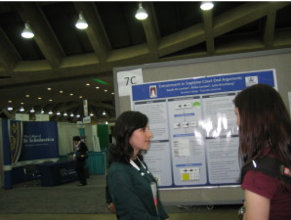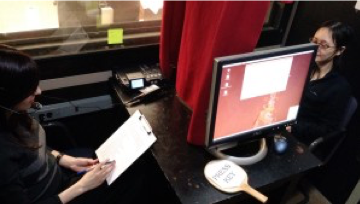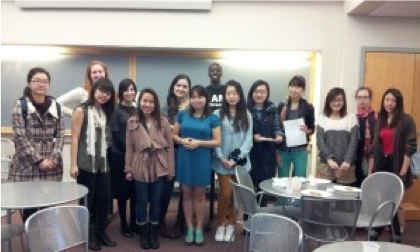Distributed Research Experience for Undergraduates: Catching up with DREU Alumna Sarah Ita Levitan

Sarah Ita presenting her DREU project at Grace Hopper.
When did you participate in DREU and what was your project about?
I participated in DREU in the summer of 2012, before my senior year of college. I worked at the Columbia Speech Lab under the guidance of Dr. Julia Hirschberg. My project involved studying entrainment patterns in US Supreme Court oral arguments. Entrainment is the phenomenon where people tend to become similar to their dialogue partner in conversation by adopting characteristics of their partner’s speech. I worked on cleaning noisy Supreme Court audio recordings and measuring and analyzing entrainment on acoustic-prosodic features (such as pitch and loudness) between lawyers and justices. We found that lawyers entrained more than justices, supporting the theory that the less dominant speaker is more likely to entrain to the more dominant speaker.
How did DREU shape your research career?

Sarah Ita conducting an experiment in the Speech Lab sound booth.
My DREU experience had a major impact on my career path. Spending a summer immersed in research in a large university lab, surrounded by people working on exciting projects in natural language and speech processing, solidified my interest in getting a PhD in computer science and pursuing a research career. I returned to the Speech Lab the following summer, and ultimately joined the Speech Lab at Columbia as a PhD student, with my DREU mentor as my PhD advisor. I feel privileged to have had such a wise and dedicated advisor, whose enthusiasm for research is contagious, and whose commitment to helping her students is extraordinary. She is passionate about encouraging women in CS and continues to mentor DREU students during the summer. Under her guidance, I have mentored some excellent DREU students.

Sarah Ita organizing a women in computer science mentorship event at Columbia.
What advice would you have for DREU mentors and DREU student participants?
The DREU program is more than an internship where a student completes a research project — it should be a mentoring relationship as well. For mentors, it is important to take the time to get to know your DREU student. Meetings should not just be about the project details — ask your student about their plans for after graduation and offer guidance and support. For students, take advantage of this rare opportunity to be mentored. Communicate as much as possible with your mentor, and don’t be afraid to ask questions if you need help. And enjoy the experience — it will fly by!
About DREU
The Distributed Research Experience for Undergraduates (DREU) is a highly selective program that matches students with a faculty mentor for a summer research experience at the faculty mentor’s home institution.
DREU interns have the opportunity to be directly involved in a research project and interact with graduate students and professors on a daily basis. This experience is invaluable for those who are considering graduate school; DREU provides a close-up view of what graduate school is really like and increases interns’ competitiveness as an applicant for graduate admissions and fellowships. Faculty mentors have the opportunity to work on their research project with new students from other institutions and to mentor future graduate students.
DREU 2020 applications for interns and mentors are open now. For more information, see https://cra.org/cra-wp/dreu/#application.






